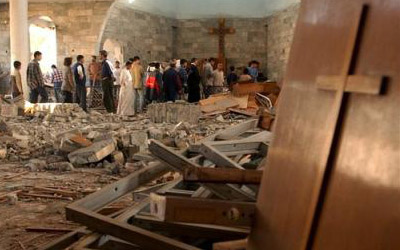 According to a new study by the British think tank Civitas, Christianity is in serious danger of becoming extinct in the Middle East.
According to a new study by the British think tank Civitas, Christianity is in serious danger of becoming extinct in the Middle East.
The study, entitled ‘Christianophobia,’ claims that half to two-thirds of Christians in the Middle East have left or have been killed over the past century. In 1945, Christian made up 20 per cent of the population in the Holy Land, but today the figure stands at 2 percent. Similar trends have been seen elsewhere in the Middle East, like in Iraq, where there were between 1.2 to 1.4 million Christians in 1990, but less than 200,000 today.
Rupert Shortt, a journalist and author of the study, says that the removal of Christianity from the Middle East has been influenced by political upheaval, Israeli nationalism, Islamic fundamentalism, and the rejection of Christianity as a vehicle for Western values or Western expansion, even though Christianity originated in the Middle East and has been integral to the region’s belief systems for 2000 years.
Shortt also points out that Christians and public authorities in the West have developed a “blind spot,” which has encouraged the discrimination or persecution of minority religious groups and could lead to further infringements of human rights. As Shortt explains, “The blind spot displayed by governments and other influential players is causing them to squander a broader opportunity. Religious freedom is the canary in the mine for human rights generally.”
But the issue of Christian oppression goes beyond the Middle East. The study also examined the treatment of Christians in Pakistan, Nigeria, India, Burma and China, and concluded that Christianity suffers more hostility across the world than any other religious group. The study estimates that 200 million Christians, or 10 per cent of Christians worldwide, are “socially disadvantaged, harassed or actively oppressed for their beliefs.” For example, there are more Christians imprisoned in China than in any other country in the world, with some estimates saying that almost 2000 house church members were arrested from May 2004 to May 2005 alone.
The study, while unavoidably limited in some respects, is helpful in identifying a problem that has been in the “blind spot” of the West for too long. As Catherine Pepinster from the Independent said,
Shortt has done a remarkable job in compiling this book when so little attention has been given in the mainstream media to the plight of Christians, apart from the most high-profile cases. Even those of us who have reported on this persecution week by week over the past decade have not realised quite how vast a problem this is: Shortt’s account reveals that Christians are oppressed in greater numbers than members of any other faith.
The oppression is, of course, not new to Christianity because, as Shortt notes, Christianity is “the only major monotheistic faith to originate in an explicit repudiation of religious violence.”